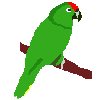[The Duke of Devonshire has joined the Free Food League, 2 which believes in measures being taken for the “mitigation of hostile tariffs”. 3 Mr. Ritchie and Lord George Hamilton 4 have followed the Duke and joined Sir Michael Hicks Beach’s League.]
See the ducal bird presiding
O’er his parrot school; besides him
Sit two chicks; such docile scholars
Any master would adore.
Little Ritchie, growing bolder,
Leans upon Lord George’s shoulder,
Chanting with the ducal parrot
That “Your food will cost you more.”
Said I, “Bird of noble station,
What on earth is ‘mitigation’?
Do you hope by feeble twaddle
British commerce to restore?
If you think our trade is failing,
Be a man, and cease this wailing;
Act, instead of falsely squawking
That ‘Your food will cost you more.’
“Will this ‘mitigation’ feed us?
Will the Yank now cease to bleed us?
Will it check the Trusts and dumpers? 5
Will it win a tariff war?
Will it draw our lands together,
Careless of the fiscal weather?”
But the parrots croaked in chorus
That “Your food will cost you more.”
“This”, I cried, “right hard to bear is!
Pray forget your ‘Little Marys’, 6
Think about the Empire’s future,
What the Fates may have in store;
If we harken to your follies,
Sure am I, oh foolish pollies,
That we’ll find you’ve spoken truly,
Saying, ‘Food will cost you more.’”
Reflecting its subject matter, this poem appeared under the heading “The Parrots”.
2The Unionist Free Food League was formed in July 1903, with Sir Michael Hicks Beach, a former Chancellor of the Exchequer, as chairman (and, later, president). In mid-October, Hicks Beach invited the Duke of Devonshire to join the League “and perhaps take a leading part in its operations”. Devonshire’s reply, dated 13 October, was published in the Times on 17 October. In it he stated his understanding of the League’s principal object as being:
to oppose the new departure in fiscal policy [. . .] which includes the taxation of food imports from foreign countries and preferential treatment of the Colonies, as well as a general tariff on imported manufactured goods.
This, as he understood it, did not involve opposition to government policy
so far as it is limited to the intention of reserving to themselves the right of proposing to Parliament tariff legislation for the purpose of the negotiation of commercial treaties and the mitigation of hostile tariffs.
A meeting of the League on 16 October resolved to “willingly accept” all the conditions laid down by the Duke, and at a meeting on 23 October he was unanimously elected President of the League, Hicks Beach stepping down to become a vice-president.
3The word ‘mitigation’ was used by the Duke in his letter of 13 October (see above). The League itself did not use the word and it does not occur in the lengthy statement of the League’s aims and beliefs that was published after its meeting of 23 October.
4C T Ritchie was the former Chancellor of the Exchequer (see poem 11 fn 01). Lord George Hamilton, a younger son of the Duke of Abercorn, was the former Secretary of State for India. Both had resigned from the Government in September 1903.
5See poem 02.
6See poem 06.

